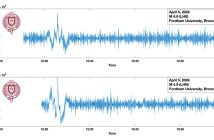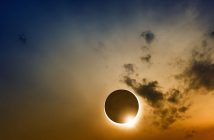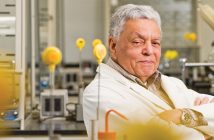What do you do?
I’ve been a Jesuit for 23 years, and I am an experimental particle physicist.
Where and when did you become a physicist?
From the mid-1980s to the mid-1990s I obtained both my thesis data and my post doc experience on the colliding detector facility at Fermilab (the U.S.-based particle physics lab).
When did you become a Jesuit?
I entered the Society of Jesus about five years after [getting my doctorate], and two years after entering that brought me to Fordham to study philosophy and theology in the scholastics program here. After some teaching experience I was sent to California, where I studied theology for three years and was ordained a priest in 2005.
What transpired in the years you stepped back from physics to become a Jesuit?
The field of particle physics had changed a lot. When I left the field in 1995, Fermilab was the world’s premier facility. But when I came back to [it], the federal government cut off funding for the super conductor that was scheduled to be built in Texas. Many particle physicists ended up gravitating toward the CERN (the European Organization for Nuclear Research) and the Large Hadron Collider in Switzerland. A group of us found that we didn’t want to go that far to take data, however.
Did you shift your focus?
The basic question that a particle physicist asks is, “What is the nature of matter?” A group of us realized that astrophysicists were asking the same questions, but they were asking deeper questions than what some of the particle physicists were asking. Particle physicists were breaking matter down to its smallest components, but astrophysicists were beginning to understand that those smallest components of matter are only a very small percentage of the total matter in the universe. Dark energy and dark matter make up 97 percent of the universe, and they’re not completely understood. Our research tries to unravel what dark enery is about.
Is that where you find God in science?
I think there’s an aspect in Christianity, which has always been there, that people are rediscovering in a more profound way: The beauty of creation is a testimony to the beauty of God. Many of the great thinkers, St. Augustine included, believe God’s love is what brought on creation. Scientists who delve into the complexities of nature, beyond the observational, are coming to the realization that there’s a deeper order, a deeper beauty, than they expected. Many argue that we humans have been given this gift of creation to unravel so we can encounter God.
If that’s the case, why aren’t more scientists believers?
I think most scientists are spiritual people, but they certainly wouldn’t want to label themselves as religious because that term brings in the rules and the practices. It has to do with the question of authority. Religious people say, “This is how it is,” and scientists say, “No, this is how it is. I will show you an experiment to prove to you why it’s not as you think.” It’s that question of who has the authority to say what is truth.
However, at some level we have to take some personal responsibility for what we believe. Religion has certain guidelines—yes some of them may seem incorrect, but on another level, some of them are good. It’s like anything else: Why do students go to college? Yes, you could go read the book by yourself, but you need that guidance to give you a framework in which to become a scholar, just like the framework in a religion helps you to become a religious spiritual person.
What’s the biggest challenge facing science today?
I think ignorance is a problem. We’ve progressed so far in our understanding of science, especially through technology. We are able to communicate across the planet with these little devices, but we’ve not increased our knowledge to keep up with that. People are more ignorant then they were in the past, but it’s deadlier now because there’s more to know. That’s what upsets a lot of scientists. When we hear of cuts in education, our teachers are made to feel unimportant. Ultimately, we need to understand that the world is a complex place, which in turn means . . . it’s not all black and white. One of the paradoxes of the modern age is that we are using all these devices that are binary—ones and zeros—and we are starting to adopt a binary view of our world in which everything is either right or wrong, good or bad.
The reality is quite the opposite. There’s a whole region where it’s not binary, a whole gradation and spectral code of things that don’t fit into an A-or-B exclusivity.


